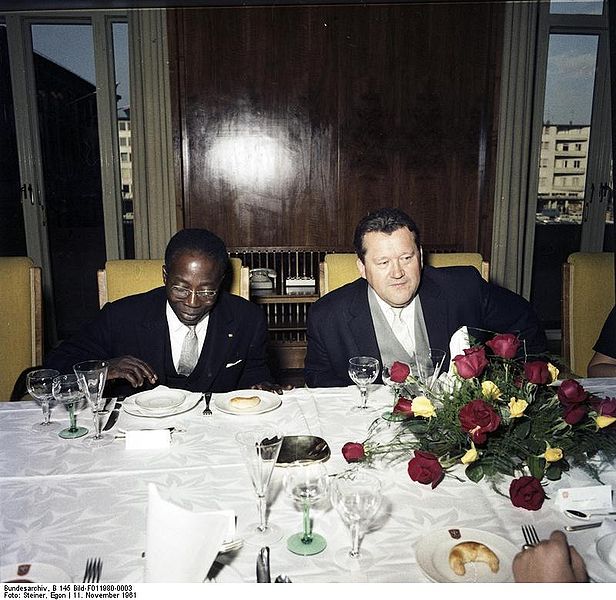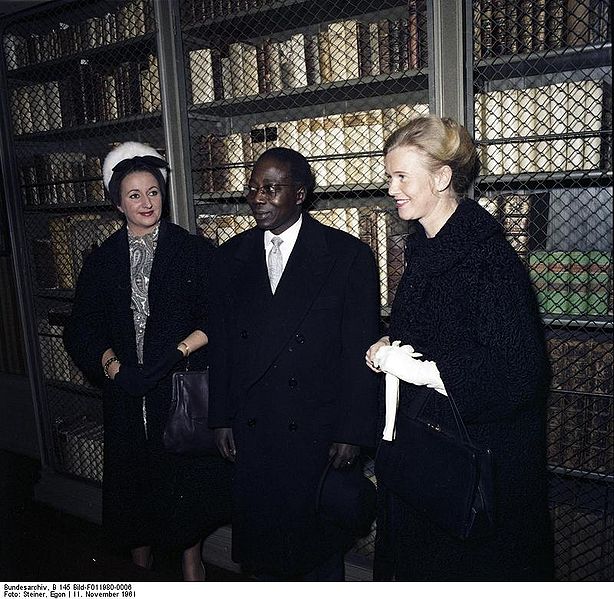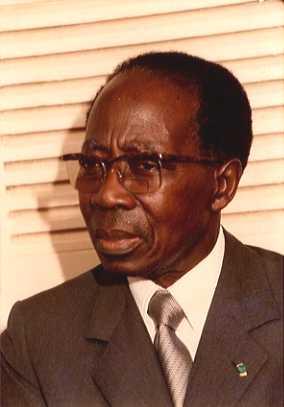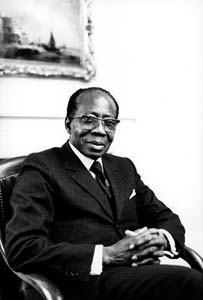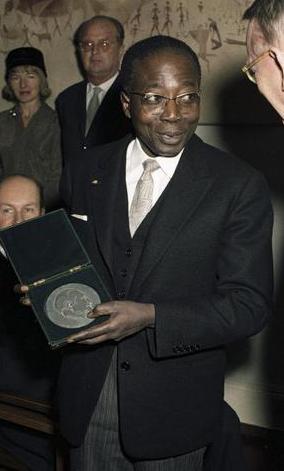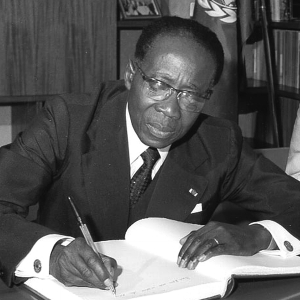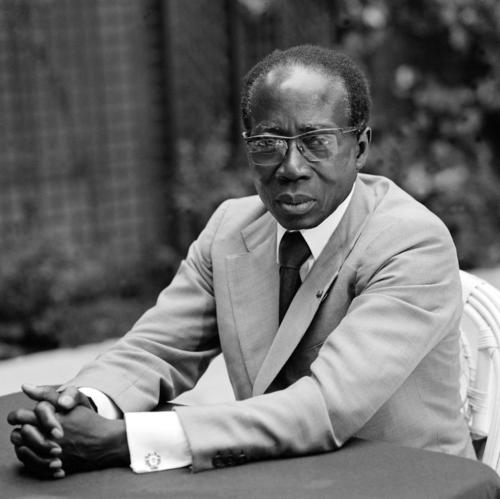<Back to Index>
- 1st President of Senegal Leopold Sédar Senghor, 1906
PAGE SPONSOR
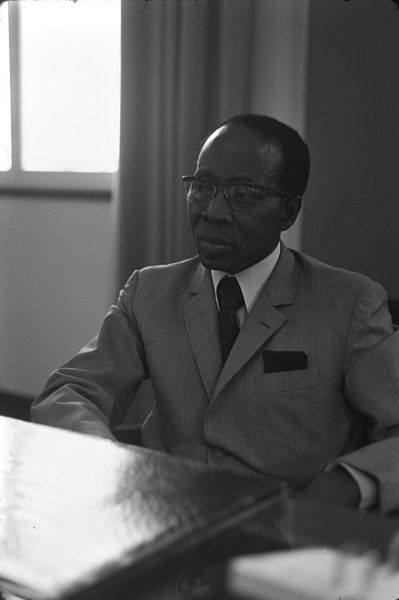
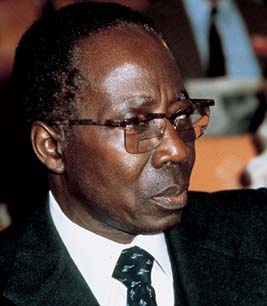
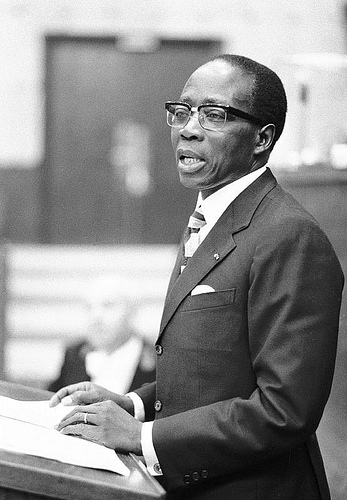
Léopold Sédar Senghor (9 October 1906 – 20 December 2001) was a Senegalese poet, politician, and cultural theorist who for two decades served as the first president of Senegal (1960 – 1980). Senghor was the first African elected as a member of the Académie française. Before independence, he founded the political party called the Senegalese Democratic Bloc. He is regarded by many as one of the most important African intellectuals of the 20th century.
Léopold Sédar Senghor (generally referred to by his Serer name "Sedar Senghor" or "Sédar Senghor" (Senegal French spelling by most Senegambians) was born on 9 October 1906 in the Serer city of Joal, some one hundred kilometers south of Dakar. Basile Diogoye Senghor (pronounced: "Basile Jogoy Senghor"), Sedar Senghor's father, was a businessman belonging to the bourgeois Serer tribe (also spelled Serer, Seereer, Sérère, Sereer) and generally referred to as the elite of Senegal by Senegambians as well as by outsiders. His father is a descendant of the Serer Royal Dynasty of Sine. The Serer people are found in Senegal, The Gambia, a small number also found in southern Mauritania. Many Serers also can be found in the West. Gnilane Ndiémé Bakhou (? - 1948), Léopold Sédar Senghor's mother, and the third wife of his father, was a Muslim of Fula origin, belonging to the Tabor tribe. She gave birth to six children, including two sons. Like other West African cultures, Serer names and surnames have meaning which are indigenous to their language. His Serer middle name"Sédar" or "Sedar" comes from the Serer language meaning "one that shall not be humiliated" (also "the one you cannot humiliate.") The name "Sedar" comes from two Serer words: "sed" which means ashamed and "ar" which means privacy. Sedar in Serer therefore gives "one who will not be shamed" in other words, "one that shall not be humiliated." As for his surname "Senghor", it is a combination of the following Serer words:
- The Serer surname "Sene" – which is "location based" and an ancient and holy Serer surname. The Supreme Deity of the Serer people in the Serer religion is called "Rog Sene" (also Roog Sene). The Serer surname "Sene" means Immensity.
- The second combination of Sedar Senghor’s surname is "ghor" or "gor" (from the old Serer word "Gorie" which means honor or honorable). They all have their roots from the Serer word "kor" which means "male". "Senghor" in Serer thus means "the honorable son of the Divine (or God)."
It should not be confused with the Portuguese word "senhor" (lord in Portuguese). Senhor is not even a Portuguese surname but a title. Further, not only are they spelled and pronounced differently, Senghor is "location based". For example the word “Faye” is a female forename in Europe whilst it is a Serer surname in West Africa. Although spelled the same way in Europe and West Africa, they are pronounced differently. When the European colonizers where standardizing the Senegambian names and surnames, they spelled them according to their convenience. Both the Senghor and Faye family have existed in Africa long before the arrival of any European including the Portuguese (the first Europeans to arrive in Senegambia). The prince of Sine Tukura Badiar Senghor, from whom Sedar Senghor has been reported to trace descent, was a thirteenth century Serer noble. That was nearly two hundred years before the arrival of the Portuguese. The confusion and misrepresentation as to the origin of his surname "Senghor" came from two of Sedar Senhor’s poems which have been taken literally: "Lettres d'hivernage, Sur la plage bercé" and "Nocturnes, Elégie des Saudades". Sedar Senghor’s middle name and surname ("Sedar" and "Senghor") are African and Serer in origin not European or Portuguese.
At the age of eight Senghor began his studies in Senegal in the Ngasobil boarding school of the Fathers of the Holy Spirit. In 1922 he entered a seminary in Dakar. After being told the religious life was not for him, he attended a secular institution. By then, he was already passionate about French literature. He won distinctions in French, Latin, Greek and Algebra. With his Baccalaureate completed, he was awarded a scholarship to continue his studies in France.
In
1928 Senghor sailed from Senegal for France, beginning in his words,
"sixteen years of wandering." Starting his post secondary studies at the Sorbonne, he quit and went on to Louis - Le - Grand to finish his prep course for entrance to the École Normale Supérieure, a grande école. Paul Cary, Henri Queffélec, Robert Verdier and Georges Pompidou were also studying at this elite institution. After failing the entrance exam, Senghor prepared for his grammar Agrégation. He was granted his agrégation in 1935 after a failed first attempt.
He graduated from the University of Paris, where he received the Agrégation in French Grammar. Subsequently, he was designated professor at the universities of Tours and Paris, where he taught during the period 1935 - 1945.
Senghor decided to start his teaching years at the Lycée René - Descartes in Tours; he also taught at the Lycée Marcelin Berthelot in Saint - Maur - des - Fosses near Paris. He also studied linguistics taught by Lilias Homburger at the École pratique des hautes études. He studied with prominent social scientists such as Marcel Cohen, Marcel Mauss and Paul Rivet (director of the Institut d'ethnologie de Paris). Senghor, along with other intellectuals of the African diaspora who had come to study in the colonial capital, coined the term and conceived the notion of "négritude", which was a response to the racism still prevalent in France. It turned the racial slur nègre into a positively connoted celebration of African culture and character. The idea of négritude informed not only Senghor's cultural criticism and literary work, but also became a guiding principle for his political thought in his career as a statesman.
In 1939, Senghor was enrolled as a French army enlisted man (2ème Classe) with the rank of private within the 59th Colonial Infantry division in spite of his higher education and his later acquisition of the French Citizenship in 1932. A year later, during the German invasion of France, he was taken prisoner by the Germans in la Charité - sur - Loire. He was interned in different camps, and finally at Front Stalag 230, in Poitiers. Front Stalag 230 was reserved for colonial troops captured during the war. German soldiers wanted to execute him and the others the same day they were captured, but they escaped this fate by yelling Vive la France, vive l'Afrique noire! ("Long live France, long live Black Africa!") A French officer told the soldiers that executing the African prisoners would dishonor the Aryan race and the German Army. In total, Senghor spent two years in different prison camps, where he spent most of his time writing poems. In 1942 he was released for medical reasons.
He resumed his teaching career while remaining involved in the resistance during the Nazi occupation.
Once the war was over, Senghor was selected as Dean of the Linguistics Department with the École Nationale de la France d'Outre - Mer, a position he would hold until Senegal's independence in 1960. While traveling on a research trip for his poetry, he met the local socialist leader, Lamine Guèye, who suggested that Senghor run for election as a member of the Assemblée nationale française. Senghor accepted and became député for
the riding of Sénégal - Mauritanie, when colonies were
granted the right to be represented by elected individuals. They took
different positions when the train conductors on the line Dakar - Niger
went on strike. Guèye voted against the strike, arguing the
movement would paralyze the colony, while Senghor supported the workers,
which gained him great support among Senegalese.
In 1947, Senghor left the African Division of the French Section of the Workers International (SFIO), which had given enormous financial support to the social movement. With Mamadou Dia, he founded the Bloc démocratique sénégalais (1948). They won the legislative elections of 1951, and Guèye lost his seat.
Re-elected deputy in 1951 as an independent overseas member, Senghor was appointed state secretary to the Council's president in Edgar Faure's government from 1 March 1955 to 1 February 1956. He became mayor of the city of Thiès, Senegal, in November 1956 and then advisory minister in the Michel Debre's government from 23 July 1959 to 19 May 1961. He was also a member of the commission responsible for drafting the Fifth Republic's constitution, general councilor for Senegal, member of the Grand Conseil de l'Afrique Occidentale Francaise and member for the parliamentary assembly of the European Council.
In 1964 Senghor published the first volume of a series of five, titled Liberté. The book contains a variety of speeches, essays and prefaces.
Senghor supported federalism for newly independent African states, a type of "French Commonwealth". Since federalism was not favored by the African countries, he decided to form, along with Modibo Keita, the Mali Federation with former French Sudan (present day Mali). Senghor was president of the Federal Assembly until its failure in 1960.
Afterwards, Senghor became the first President of the Republic of Senegal, elected on 5 September 1960. He is the author of the Senegalese national anthem. The prime minister, Mamadou Dia, was in charge of executing Senegal's long term development plan, while Senghor was in charge of foreign relations. The two men quickly disagreed. In December 1962, Mamadou Dia was arrested under suspicion of fomenting a coup d'état. He was held in prison for twelve years. Following this, Senghor created a presidential regime.
On 22 March 1967, Senghor survived an assassination attempt. The suspect, Moustapha Lô, pointed his pistol towards the President after he had participated in the sermon of Tabaski, but the gun did not fire. Lô was sentenced to death for treason and executed on 15 June 1967, even though it remained unclear if he had actually wanted to kill Senghor.
Senghor resigned his position before the end of his fifth term in December 1980. Abdou Diouf replaced him as the head of the country. Under his presidency, Senegal adopted a multi - party system (limited to three: socialist, communist and liberal). He
created a performing education system. Despite the end of official
colonialism, the value of Senegalese currency continued to be fixed by
France, the language of learning remained French, and Senghor ruled the
country with French political advisors.
He supported the creation of la Francophonie and was elected vice - president of the High Council of the Francophonie.
In
1982, he was one of the founders of the Association France and
developing countries whose objectives were to bring attention to the
problems of developing countries, in the wake of the changes affecting
the latter.
He was elected a member of l'Académie française on 2 June 1983, at the 16th seat where he succeeded Antoine de Lévis Mirepoix. He was the first African to sit at the Academie. The entrance ceremony in his honor took place on 29 March 1984, in presence of then French President François Mitterrand. This was considered as a further step towards greater openness in the Académie, after the previous election of a woman, Marguerite Yourcenar.
In 1993, the last and fifth book of the Liberté series was published: Liberté 5: le dialogue des cultures.
"Je
ne suis pas sûr de mourir. Et si c'était ça
l'enfer?" ("I'm not sure about death. What if that were hell?") said
Senghor, post - retirement, in 1996.
He spent the last years of his life with his wife in Verson, near the city of Caen in Normandy, where he died on 20 December 2001. His funeral was held on 29 December 2001 in Dakar. Officials attending the ceremony included Raymond Forni, president of the Assemblée nationale and Charles Josselin, state secretary for the minister of foreign affairs, in charge of the Francophonie. Jacques Chirac (who
said, upon hearing of Senghor's death: "Poetry has lost one of its
masters, Senegal a statesman, Africa a visionary and France a friend") and Lionel Jospin, respectively president of the French Republic and the prime minister,
did not attend. Their failure to attend Senghor's funeral made waves as
it was deemed a lack of acknowledgement for what the politician had
been in his life. The analogy was made with the Senegalese Tirailleurs who,
after having contributed to the liberation of France, had to wait more
than forty years to receive an equal pension (in terms of buying power)
to their French counterparts. The scholar Erik Orsenna wrote in the newspaper Le Monde an editorial titled: "J'ai honte" (I am ashamed).
Although a socialist, Senghor avoided the Marxist and anti - Western ideology that had become popular in post - colonial Africa, favoring the maintenance of close ties with France and the western world. This is seen by many as a contributing factor to Senegal's political stability: it remains one of the few African nations never to have had a coup, and always to have had a peaceful transfer of power.
Senghor's tenure as president was characterized by the development of African socialism, which was created as an indigenous alternative to Marxism, drawing heavily from the négritude philosophy. In developing this, he was assisted by Ousmane Tanor Dieng. On 31 December 1980, he retired in favor of his prime minister, Abdou Diouf.
Seat
number 16 of the Académie was vacant after the Senegalese poet's
death. He was ultimately replaced by another former president, Valéry Giscard d'Estaing.
Senghor received several honors in the course of his life. He was made Grand - Croix of the Légion d'honneur, Grand - Croix of the l'Ordre national du Mérite, commander of arts and letters. He also received academic palms and the Grand - Croix of the l'Ordre du lion du Sénégal. His war exploits earned him the medal of Reconnaissance franco - alliée 1939 - 1945 and the combattant cross 1939 - 1945. He was named honorary doctor of thirty - seven universities.
The French Language International University in Alexandria was officially open in 1990 and was named after him.
In 1994 he was awarded the Lifetime Achievement Award by the African Studies Association; however, there was controversy about whether he met the standard of contributing "a lifetime record of outstanding scholarship in African studies and service to the Africanist community." Michael Mbabuike, president of the New York African Studies Association (NYASA), said that the award also honors those who have worked "to make the world a better place for mankind."
The airport of Dakar was renamed Aéroport International Léopold Sédar Senghor in 1996, on his 90th birthday.
The Passerelle Solférino in Paris was renamed after him in 2006, on the centenary of his birth.
His poetry was widely acclaimed, and in 1978 he was awarded the Prix mondial Cino Del Duca. His poem A l'appel de la race de Saba published in 1936 was inspired by the entry of Italian troops in Addis Ababa. In 1948, Senghor compiled and edited a volume of Francophone poetry called Anthologie de la nouvelle poésie nègre et malgache for which Jean - Paul Sartre wrote an introduction, titled "Orphée Noir" (Black Orpheus).
For his epitaph was a poem he had written, namely:
- Quand je serai mort, mes amis, couchez-moi sous Joal - l'Ombreuse.
- Sur la colline au bord du Mamanguedy, près l'oreille du sanctuaire des Serpents.
- Mais entre le Lion couchez - moi et l'aïeule Tening - Ndyae.
- Quand je serai mort mes amis, couchez - moi sous Joal - la - Portugaise.
- Des pierres du Fort vous ferez ma tombe, et les canons garderont le silence.
- Deux lauriers roses - blanc et rose - embaumeront la Signare.
- When I'm dead, my friends, place me below Shadowy Joal,
- On the hill, by the bank of the Mamanguedy, near the ear of Serpents' Sanctuary.
- But place me between the Lion and ancestral Tening - Ndyae.
- When I'm dead, my friends, place me beneath Portuguese Joal.
- Of stones from the Fort build my tomb, and cannons will keep quiet.
- Two oleanders -- white and pink -- will perfume the Signare.
With Aimé Césaire and Léon Damas, Senghor created the concept of Négritude, an important intellectual movement that sought to assert and to valorize what they believed to be distinctive African characteristics, values, and aesthetics. This was a reaction against the too strong dominance of French culture in the colonies, and against the perception that Africa did not have culture developed enough to stand alongside that of Europe. Building upon historical research identifying ancient Egypt with black Africa, Senghor argued that sub - Saharan Africa and Europe are in fact part of the same cultural continuum, reaching from Egypt to classical Greece, through Rome to the European colonial powers of the modern age. Négritude was by no means — as it has in many quarters been perceived — an anti - white racism, but rather emphasized the importance of dialogue and exchange among different cultures (e.g., European, African, Arab, etc.)
A related concept later developed in Mobutu's Zaire is that of authenticité or Authenticity.
